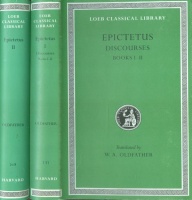categories
- Traffic and Vehicles Catalogue
- socreal.catalog
- Advertisement Catalogue
- Photo Catalogue
- Chinese and Japanese Catalogue
- New Holy Card Catalogue II.
- 12 interesting old books
 Books
Books
 Bibliophil
Bibliophil
 Antiques
Antiques
 Engraving
Engraving
 Maps
Maps
 Photos
Photos
 Antique Papers, Small Prints
Antique Papers, Small Prints
 Posters
Posters
- Circus
- Modern Graphics
- Socialist Realism
- NER Propaganda
- Others
cart
Cart is empty
You've not logged in
Epictetus : The Discourses I-II
- description
- additional information
Volume I: The Discourses as reported by Arrian. Books I-II.
Volume II: The Discourses. Books III-IV. Fragments. Encheiridion.
With an English translation by W. A. Oldfather.
Ógörög - angol kétnyelvű kiadás.
Language: Ancient Greek - English.
Loeb Classical Library No. 131-218.
Epictetus was a crippled Greek slave of Phrygia during Nero's reign (54–68 CE) who heard lectures by the Stoic Musonius before he was freed. Expelled with other philosophers by the emperor Domitian in 89 or 92 he settled permanently in Nicopolis in Epirus. There, in a school which he called 'healing place for sick souls', he taught a practical philosophy, details of which were recorded by Arrian, a student of his, and survive in four books of Discourses and a smaller Encheiridion, a handbook which gives briefly the chief doctrines of the Discourses. He apparently lived into the reign of Hadrian (117–138 CE).
Epictetus was a teacher of Stoic ethics, broad and firm in method, sublime in thought, and now humorous, now sad or severe in spirit. How should one live righteously? Our god-given will is our paramount possession, and we must not covet others'. We must not resist fortune. Man is part of a system; humans are reasoning beings (in feeble bodies) and must conform to god's mind and the will of nature. Epictetus presents us also with a pungent picture of the perfect (Stoic) man.
Volume II: The Discourses. Books III-IV. Fragments. Encheiridion.
With an English translation by W. A. Oldfather.
Ógörög - angol kétnyelvű kiadás.
Language: Ancient Greek - English.
Loeb Classical Library No. 131-218.
Epictetus was a crippled Greek slave of Phrygia during Nero's reign (54–68 CE) who heard lectures by the Stoic Musonius before he was freed. Expelled with other philosophers by the emperor Domitian in 89 or 92 he settled permanently in Nicopolis in Epirus. There, in a school which he called 'healing place for sick souls', he taught a practical philosophy, details of which were recorded by Arrian, a student of his, and survive in four books of Discourses and a smaller Encheiridion, a handbook which gives briefly the chief doctrines of the Discourses. He apparently lived into the reign of Hadrian (117–138 CE).
Epictetus was a teacher of Stoic ethics, broad and firm in method, sublime in thought, and now humorous, now sad or severe in spirit. How should one live righteously? Our god-given will is our paramount possession, and we must not covet others'. We must not resist fortune. Man is part of a system; humans are reasoning beings (in feeble bodies) and must conform to god's mind and the will of nature. Epictetus presents us also with a pungent picture of the perfect (Stoic) man.
| condition: |      |
| category: | Books > Classical Philology > |
| category: | Books > Philosophy > |
| category: | Books > Foreign Language Books > Books in English > |
| publisher: | Harvard University Press, (1996) |
| item number / ISBN: | 9780674991453 |
| binding: | cloth bound (in original dust jacket) |
| pages: | XXXVII, 436; 559 |
| language: | English |











 Telefon:
Telefon: E-mail:
E-mail:







